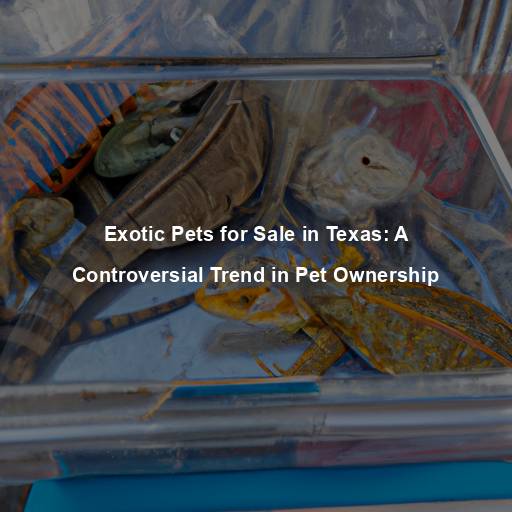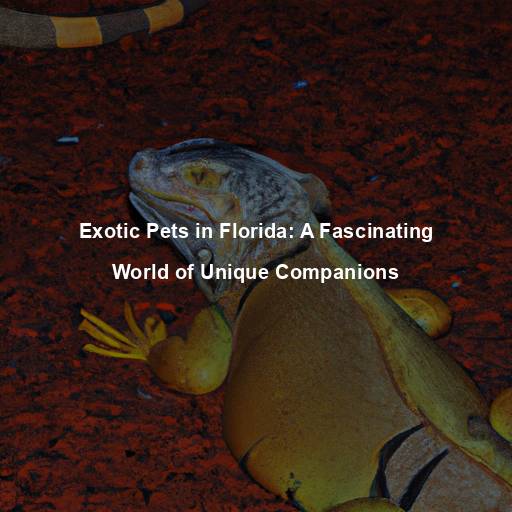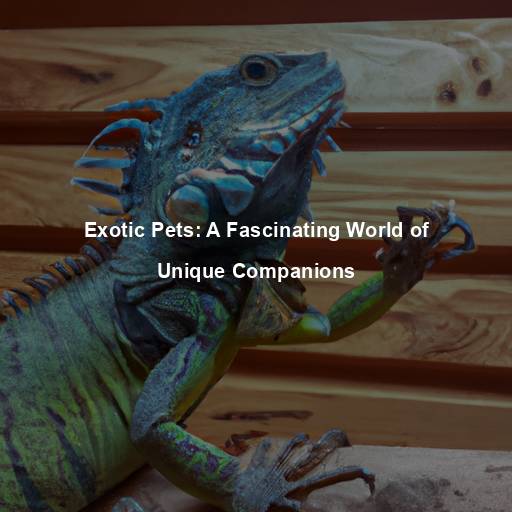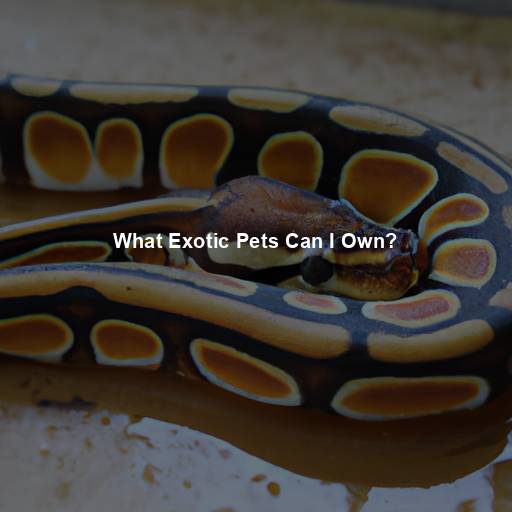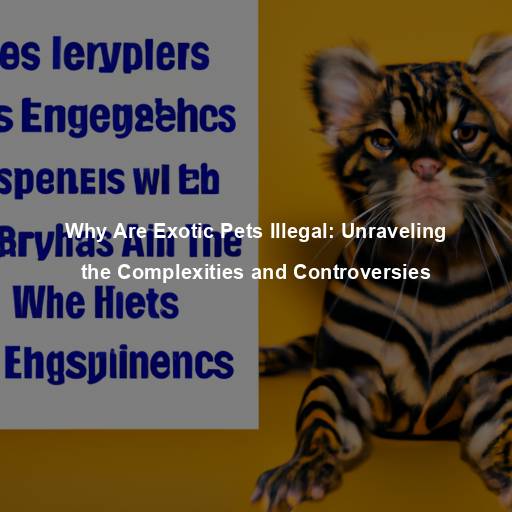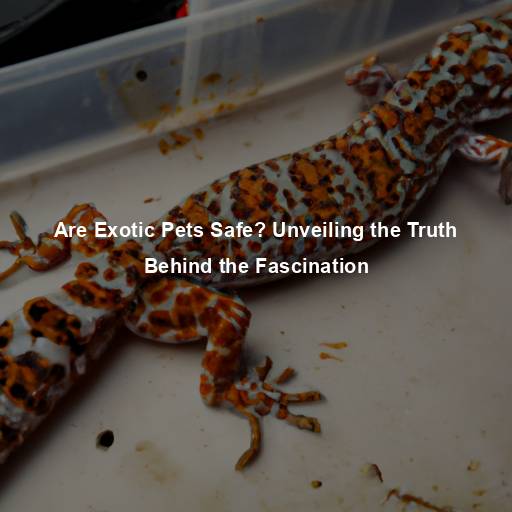Exotic Pets for Sale in Texas: A Controversial Trend in Pet Ownership
Last Updated on July 17, 2023 by Evan
Contents [hide]
- 1 The Allure of Exotic Pets
- 2 Legal and Ethical Considerations
- 3 Alternatives to Exotic Pet Ownership
- 4 The Future of Exotic Pet Ownership
- 5 The Importance of Education and Regulation
- 6 Ethical Considerations and Animal Welfare
- 7 The Balancing Act: Ethical Exotic Pet Ownership
- 8 FAQs – Exotic Pets for Sale in Texas
- 8.1 What are considered exotic pets in Texas?
- 8.2 Where can I find exotic pets for sale in Texas?
- 8.3 Are exotic pets legal to own in Texas?
- 8.4 What considerations should I keep in mind before getting an exotic pet?
- 8.5 Are there any risks associated with owning exotic pets in Texas?
- 8.6 How should I prepare to bring an exotic pet home?
The Allure of Exotic Pets
Exotic pets have long captured the imaginations of animal lovers. From majestic big cats to colorful reptiles, these unique creatures offer a sense of wonder and fascination that is hard to resist. For some, the desire to own an exotic pet stems from a genuine love for these animals and a desire to provide them with a safe and loving home. However, the growing trend of exotic pets for sale in Texas has sparked debate and raised concerns about the ethics and welfare of these animals.
The Appeal and Challenges of Owning Exotic Pets
Owning an exotic pet can be an enticing proposition for many individuals. The allure of having a rare and exotic animal as a companion can be a status symbol and a source of pride. Moreover, the opportunity to interact closely with these creatures can provide a unique and fulfilling experience. However, it is important to acknowledge the challenges that come with owning exotic pets.
Specialized Care Requirements
Exotic pets often have specific care needs that can be challenging to meet. From temperature and habitat requirements to specialized diets and socialization needs, providing adequate care for these animals demands a deep understanding of their natural behaviors and environmental needs.
Legal and Ethical Considerations
Owning exotic pets is like navigating a wild maze of legal uncertainty, with each state holding its own set of rules and regulations. From the strict enforcers who clamp down on even the thought of owning a leopard gecko to the laissez-faire territories where you can practically adopt a zebra just before breakfast, the legal landscape is a perplexing jungle. Take Texas, for instance, where the exotic pet market thrives, but the ethical dilemmas and safety concerns loom large, leaving us to ponder the fine line between responsible ownership and disastrous consequences.
Impact on Conservation Efforts
The trade of exotic pets can have detrimental effects on wild populations. Many of these species are threatened or endangered in their natural habitats, and capturing them for the pet trade only exacerbates their precarious situation. It is crucial to consider the impact that the demand for exotic pets has on conservation efforts and the long-term survival of these species in the wild.
Exotic Pets for Sale in Texas: An Ethical Dilemma
The enchanting world of unique pets for sale in the majestic state of Texas has ignited a raging debate, stirring the hearts and minds of animal defenders, nature protectors, and dedicated pet lovers alike. As the flames of controversy dance in the air, passionate voices clash over the moral complexities of possessing these extraordinary creatures. While some champion the merits of responsible guardianship, citing potential for educational enlightenment and vital funds for preservation, a stark opposing chorus resonates, condemning the trade as an unfortunate perpetuation of a grim cycle of abuse and greed.
Welfare Concerns
It’s truly a perplexing reality that the allure of exotic pets often masks the burstiness of their hidden confinement, stress, and neglect. These extraordinary creatures, with their complex social structures and specific environmental needs, find themselves trapped in a domestic existence that lacks the resources to adequately satisfy their yearnings. The disheartening truth then reveals itself, as the unethical practices of illegal smuggling and questionable breeding darken the already grim picture, subjecting these animals to further anguish and suffering.
Public Safety Risks
Exotic pets, by their very nature, can pose significant risks to public safety. While some species may appear harmless when young, they can become unpredictable and dangerous as they mature. Incidents of attacks by pet tigers, venomous snakes, and other exotic animals have raised concerns about the potential dangers associated with owning these creatures.
Conservation and Education
There’s a fiery debate going on about owning exotic pets and its impact on conservation. On one hand, proponents argue that responsible ownership can actually be a catalyst for saving endangered species. They believe that by having these unique animals in our lives, we can awaken a sense of connection and raise funds to support their preservation. However, critics counter that we should put our efforts into protecting habitats and promoting in-situ conservation, rather than promoting a thriving trade of exotic pets.
Striking a Balance: Responsible Exotic Pet Ownership
While the debate surrounding exotic pets for sale in Texas is complex and multifaceted, there are steps that can be taken to ensure responsible ownership and minimize the negative impact on animals and the environment.
Research and Education
Before considering owning an exotic pet, it is essential to thoroughly research the specific species and their care requirements. Understanding the animal’s natural habitat, diet, behavior, and social needs is crucial for providing appropriate care and ensuring their well-being.
Adoption and Rescue
Discover a marvelous alternative to obtaining rare and extraordinary pets! Instead of venturing down the conventional path of acquiring exotics from breeders or dealers, why not explore the enchanting realm of adoption? Embrace the perplexing tales of these rare beings, who, through unfortunate circumstances of neglect or abandonment, find solace in the comforting arms of rescue organizations and sanctuaries. By embracing this virtuous method, you grant these unparalleled creatures a second chance at a fulfilling life, simultaneously advocating for ethical practices.
Support Conservation Initiatives
When it comes to our relationship with endangered species, let’s embark on a new adventure. Rather than delving into the unpredictable world of the exotic pet trade, let’s channel our passion toward supporting organizations dedicated to in-situ conservation efforts. By donating to wildlife sanctuaries, rolling up our sleeves and participating in volunteer programs, and speaking up for habitat preservation, we can unlock the true magic of making a meaningful impact and preserving these precious creatures for generations to come. So, let’s break free from the ordinary and embrace the captivating journey of protecting our planet’s most vulnerable inhabitants.
Unregulated Breeding and Smuggling
The insatiable desire for rare and unique pets drives an illicit industry that thrives in clandestine corners, evading any semblance of legal boundaries. Within this murky realm, unscrupulous individuals, both breeders and traffickers, engage in a web of appalling practices – from illegal smuggling to the merciless plundering of wildlife and the perpetuation of inhumane breeding conditions. The grim consequences reverberate far beyond the immediate victims, extending to a relentless cycle of pain and suffering.
Health Risks for Humans and Animals
The world of exotic pets is a captivating one, but behind the allure lies a perplexing truth. These enchanting creatures, while fascinating, can bring about a multitude of health concerns, leaving both owners and animals in a state of wonder. From the untamed realm of zoonotic diseases like salmonella and herpes B, to the uncharted terrain of inadequate care and psychological distress, the journey of owning an exotic pet is one filled with bursts of unpredictability, questioning the very fabric of their well-being.
Invasive Species and Ecological Disruption
The release or escape of exotic pets into the wild can have devastating consequences for local ecosystems. These animals may outcompete native species for resources, prey on local wildlife, and disrupt delicate ecological balances. Invasive species, such as the Burmese python in Florida or the red lionfish in the Caribbean, are prime examples of the ecological damage that can result from the release of exotic pets.
Legal and Ethical Considerations
The world of exotic pet ownership is a bizarre maze, filled with twists and turns that can leave even the most seasoned enthusiasts puzzled. From the tangled web of legal red tape to the quagmire of ethical dilemmas, the landscape is as perplexing as a riddle without an answer. Take, for instance, the state of Texas, where an enigma unfolds – the laws governing exotic pets are certainly not for the faint of heart. In this strange land, one finds a peculiar blend of leniency and liberty, resulting in a veritable marketplace for the extraordinary.
The Need for Stricter Legislation
With the alarming risks and ethical dilemmas hovering over the realm of exotic pet ownership, the demand for more stringent regulations is reaching a crescendo. Vocal proponents, comprising advocacy groups and animal welfare organizations, contend that robust legislation is imperative to shield these extraordinary creatures as well as the general populace from untoward incidents. As the concerns grow, the urgency to establish comprehensive laws becomes all the more palpable.
The Role of Public Awareness
It’s no secret that the world of exotic pet ownership is a hot topic, buzzing with controversy and confusion. But here’s the deal: we need to shed some light on the ethical nightmare that often comes with it. So, picture this: education campaigns, riveting documentaries, and on-the-ground outreach programs, all working together to dismantle the misconceptions and reveal the underbelly of the exotic pet trade. It’s time to embrace responsible pet ownership and collectively say no to the allure of owning an exotic creature, paving the way for a kinder, more compassionate approach to animal welfare.
Alternatives to Exotic Pet Ownership
For those who are drawn to the allure of exotic animals but recognize the ethical concerns, there are alternative ways to appreciate and support these creatures without owning them as pets.
Visit Accredited Zoos and Sanctuaries
Venturing into accredited zoos and sanctuaries gives curious souls a kaleidoscopic glimpse into the enchanting world of exotic animals, where wonder and knowledge meld into a symphony of perplexity. Within the carefully cultivated confines of these sanctuaries, the paramount importance placed on the welfare of these captivating creatures resonates deeply. By embarking on this experiential journey, one not only becomes a spectator to the awe-inspiring beauty of these animals but also becomes a catalyst for conservation efforts, tangibly enabling responsible practices to merrily flourish.
Volunteer for Wildlife Rehabilitation Programs
Experience the thrill and fulfillment of aiding in the rehabilitation of magnificent creatures caught in the clutches of the exotic pet trade. By becoming involved in wildlife rehabilitation programs, you can embark on a journey unlike any other – one that brings you face to face with exotic animals desperate for a second chance. Witness their awe-inspiring resilience as they receive the care they so desperately need, with the ultimate reward being the joy of releasing them back into the wild, where they truly belong.
Support Conservation Organizations
One powerful way to truly make an impact and bring about positive change is by throwing our support behind conservation organizations that prioritize the well-being of the intricate web of exotic species and their habitats. These organizations are steadfastly committed to the protection of delicate ecosystems and the preservation of endangered species, ensuring a glimmer of hope for their existence in the generations to come. By generously donating to these noble causes, individuals play an active role in safeguarding these invaluable treasures of biodiversity, stirring waves of transformation and leaving an indelible mark on the world.
The Future of Exotic Pet Ownership
As we delve deeper into the intricate layers of societal consciousness, a swirling aura of perplexity surrounds the uncertain fate of the exotic pet ownership phenomenon. An ethereal dance between rigid legislation, the dawning of public enlightenment, and a paradigm shift towards conscientious practices holds the key to unraveling the enigma of a more compassionate world for these extraordinary creatures. The intricate tapestry of our collective awakening is being woven, thread by thread, as we navigate the delicate tightrope between care and conservation. The future remains shrouded in intrigue, as we embark on this tantalizing journey towards harmonizing humanity’s desires with the ethereal essence of exotic animal welfare.
When it comes to the emotional bond between humans and exotic pets, the complexity of the issue cannot be understated. The allure of these extraordinary creatures is undeniable, captivating our imagination and stirring a sense of wonder within us. Yet, beneath the surface of this enchantment lies a web of ethical considerations and responsibilities that demand our attention. It is a delicate balancing act between admiration and restraint, as we navigate the perplexing landscape of owning and caring for these unique beings.
While the debate surrounding exotic pet ownership is rife with concerns and controversies, it is important to acknowledge the deep emotional connections that can form between humans and these unique animals. For some individuals, the bond with an exotic pet can be as profound and meaningful as any other companionship.
Unique Companionship
Have you ever considered the extraordinary connections that can be forged between humans and exotic pets? Picture a parrot effortlessly mimicking its owner’s voice, a reptile surprisingly recognizing its caregiver, or a primate exhibiting intricate emotions. These captivating creatures offer unparalleled companionship, leaving us astounded and enriched by their unanticipated yet profound emotional support. Prepare to be bewildered by the unexpected depths of these unique bonds.
Education and Inspiration
There’s something truly captivating about sharing our lives with exotic pets. They have a way of igniting our curiosity and sparking a yearning to explore the depths of diverse species and ecosystems. And for children fortunate enough to grow up alongside these extraordinary creatures, a world of wonder unfolds before their eyes, instilling in them a deep-rooted passion for conservation. These enigmatic animals, with their unique characteristics and mesmerizing behaviors, possess an uncanny ability to unlock our understanding of why safeguarding their natural habitats is of paramount importance.
Responsible Ownership and Advocacy
In the ongoing discourse concerning the ownership of exotic pets, it becomes increasingly pressing to acknowledge the potential contribution of responsible ownership in conservation endeavors. Those who possess knowledge and a sincere commitment can emerge as steadfast champions for the species they possess, harnessing their distinctive encounters to foster awareness and rally support for conservation initiatives. By opening up about their narratives and advocating for responsible practices, these individuals possess the capability to proactively enhance the welfare of both captive and wild populations.
The Importance of Education and Regulation
To ensure the welfare of exotic animals and mitigate the negative impacts of the exotic pet trade, education and regulation are key factors that need to be addressed.
Comprehensive Education Programs
The world of exotic pets is a fascinating and enigmatic one, filled with a whirlwind of demands and considerations. With the aim of fostering responsible ownership, education emerges as a crucial tool, enlightening and guiding potential exotic pet enthusiasts on the path to informed choices. By delving into the realms of habitat requirements, nutritional peculiarities, and the countless challenges that arise, educational programs extract the veil of mystery surrounding these extraordinary creatures, arming future owners with the knowledge needed to navigate the beautiful yet perplexing world of exotic pets.
Licensing and Permitting
In a world where the ownership of exotic pets has become a hot topic, introducing licensing and permitting systems seems like a logical step towards bringing order to the animal kingdom. These systems not only aim to regulate the possession of these magnificent creatures but also form a barrier to separate the knowledgeable enthusiasts from the mere dreamers. Prospective owners would have to jump through hoops of criteria, showcasing their expertise, solidifying their capability to provide top-notch care, and embracing stringent guidelines. With permits in hand, authorities will be able to exercise their watchful eyes, ensuring that responsible ownership prevails over wild ambitions.
Enforcement of Existing Laws
Across various regions, regulations are in existence to govern the possession of exotic animals. Nevertheless, the implementation and adherence to these laws frequently leave much to be desired, leaving room for clandestine practices and circumventions. By bolstering enforcement protocols and escalating penalties for non-compliance, the potential for deterring such activities and safeguarding the well-being of these creatures is significantly heightened.
Ethical Considerations and Animal Welfare
The complex moral implications surrounding the ownership of exotic pets arise from the inherent risks and harm that can befall these beautiful creatures. Our utmost priority must lie in safeguarding their well-being and ensuring their welfare is upheld to the highest standard.
Promoting Adoption and Rescue
Embracing the noble cause of embracing and nurturing exotic animals is a profound step towards embracing a compassionate and ethical path. As the shadows languish with neglect and abandonment, hopeful souls find solace in rescue centers and sanctuaries. By choosing to adopt these marvelous creatures, we not only offer them a renewed lease on life but also vehemently denounce the abhorrent machinations of the exotic pet trade.
Supporting Ethical Breeders and Sanctuaries
If individuals choose to acquire exotic pets from breeders, it is crucial to ensure that those breeders adhere to ethical practices. Responsible breeders prioritize the health and welfare of their animals, maintain proper documentation, and promote responsible ownership. Supporting these breeders helps create a demand for ethical practices in the industry.
Encouraging Research and Conservation Efforts
In a world where the allure of exotic pets is undeniable, it is crucial for their owners to dive deep into the sea of opportunity and actively support research and conservation efforts. By immersing themselves in scientific studies, participating in conservation programs, and generously donating to organizations that tirelessly preserve natural habitats and species, these owners can quell the rising tide of concern regarding the negative impacts associated with the exotic pet trade. Every individual’s involvement has the potential to make a ripple effect in the vast ocean of conservation, leading us towards a more harmonious coexistence with these extraordinary creatures.
The Balancing Act: Ethical Exotic Pet Ownership
Owning an exotic pet comes with great responsibility. It requires a delicate balance between the desire to experience the unique companionship of these animals and the obligation to prioritize their welfare and the preservation of their species in the wild.
In our quest for a harmonious coexistence between humans and exotic pets, education emerges as a vital catalyst. By embracing the complexities and uncertainties surrounding this intricate matter, we can navigate the perplexing terrain of ownership with compassion and responsibility. Through our advocacy for stricter regulations and ethical practices, we aspire to safeguard the well-being of these captivating creatures while honoring the preservation of their natural habitats. Together, let us embark on a transformative journey towards a future where empathy and respect guide our every decision, forging a genuine bond between humans and exotic pets that transcends boundaries.
FAQs – Exotic Pets for Sale in Texas
What are considered exotic pets in Texas?
Exotic pets in Texas generally refer to animals that are not commonly found as traditional household pets, such as dogs and cats. These can include various types of reptiles like snakes, lizards, or turtles, small mammals like ferrets, hedgehogs, or sugar gliders, birds such as parrots or cockatoos, and even larger animals like monkeys, zebras, or big cats. It is important to note that the definition of exotic pets can vary, so it is advisable to check with local authorities or exotic pet dealers for a complete list.
Where can I find exotic pets for sale in Texas?
Discovering the enigmatic world of exotic pets in Texas can be an awe-inspiring journey filled with puzzling twists and turns. One captivating avenue to explore is the realm of specialized exotic pet stores and breeders, where curious critters from distant lands await their destined companions. These ethereal establishments hold the key to unraveling the secrets of proper care and can offer invaluable guidance on the outlandish needs and idiosyncrasies of each captivating species. For those intrepid souls seeking a more digital quest, the virtual realm teems with enigmatic online platforms and classified ads, where the enigmatic allure of exotic pets for sale plumbs the depths of curiosity and tugs at the strings of perplexity. Yet, tread with caution, for only by choosing reputable sources can we ensure the harmonious existence and legality of embracing an enigma that is an exotic pet.
Are exotic pets legal to own in Texas?
Navigating the complex world of exotic pet ownership in Texas can be as perplexing as deciphering an ancient hieroglyph. In this enigmatic realm, the legality of welcoming a captivating creature into your home can be as elusive as the mythical unicorn itself. While some exotic species are warmly embraced by the Lone Star State, others dance with the specter of requiring permits or licenses to be embraced within the law’s tender embrace. The Texas Parks and Wildlife Department, a gatekeeper in this labyrinthine realm, oversees certain reptiles and grandiose mammals, yet even they must share the stage with cities and counties, each with their own mysterious codes and regulations, governing the presence of these extraordinary animals. To avoid being ensnared in a legal tangle, it is essential to embark on a quest of research, probing both state and local legislation, and seeking guidance from the guardians of the land before embarking on this extraordinary pet ownership journey.
What considerations should I keep in mind before getting an exotic pet?
Considering the idea of acquiring an exotic pet? Brace yourself for a whirlwind of perplexities and thoughtful contemplations. Prioritize digging deep into the particular species that has caught your eye, unearthing the secrets of their needs, behaviors, and lifespans. Ranging from intricate dietary preferences to social needs and potential health complications, unraveling these complexities is mandatory to provide optimal care. Brace yourself for the puzzling reality that catering to exotic pets often demands specialized enclosures, diets, and veterinary attention, which surpasses the challenges faced with traditional pets. Brace yourself for the emotional marathon you’re about to embark on, as many exotic animals have astonishingly long lifespans. Oh, and have you acquainted yourself with the local laws and regulations that govern the ownership of these extraordinary creatures? With the pieces of this perplexing puzzle slowly falling into place, you’re inching closer to unraveling the enigma that is an exotic pet. Good luck!
Are there any risks associated with owning exotic pets in Texas?
There is an undeniable allure to owning an exotic pet, but let’s not forget about the enigmatic risks that come with it. We’re talking about zoonotic diseases that can be silently transmitted from these extraordinary creatures to us mere humans. Now, don’t get me started on their peculiar behaviors – we’re talking bites and scratches here. Moreover, these captivating creatures often have exceptionally complex needs – from the environment they thrive in to the specific diet they demand. Neglecting these subtle nuances can lead to health issues and perplexing behavioral disturbances. So buckle up, folks, because if you’re truly set on venturing into the world of exotic pet ownership, make sure you’re well-equipped with regular vet visits, proper handling techniques, and all the necessary arrangements.
How should I prepare to bring an exotic pet home?
As the anticipation of bringing an exotic addition into your home grows, it is imperative to embark on proper pre-adoption preparation. The first step is creating an enclosure or habitat that not only suits the unique needs of the species you are embracing but also guarantees their safety. Take the time to educate yourself on the essential supplies required, including bedding, food, water dishes, toys, and specialized equipment. Remember to locate an experienced exotic veterinarian who can offer routine check-ups and address any health issues that may arise. Lastly, dive deep into understanding the behavior, specific necessities, and the probable hurdles that come with caring for an exotic pet, ensuring you are fully equipped to maintain a secure and nurturing environment for your newfound companion.

